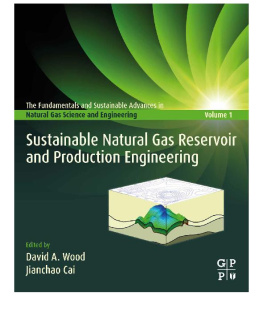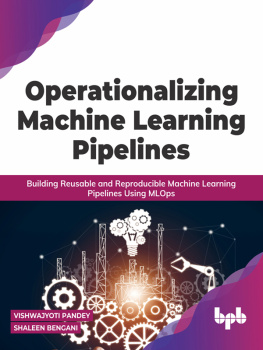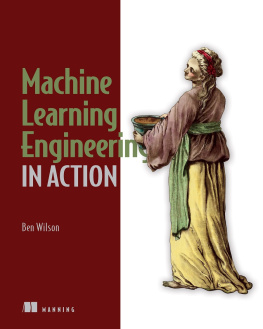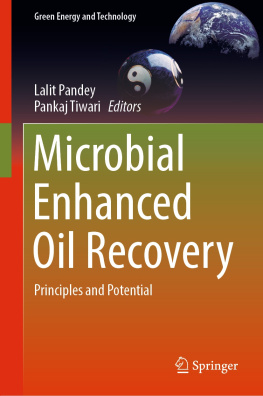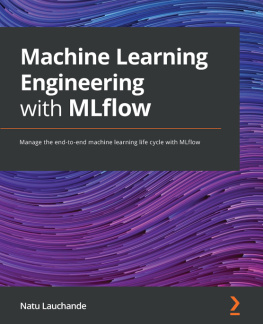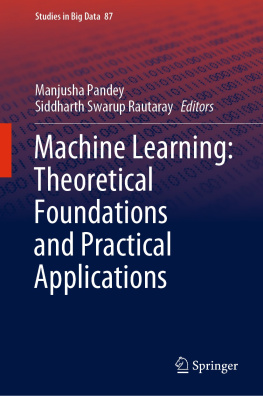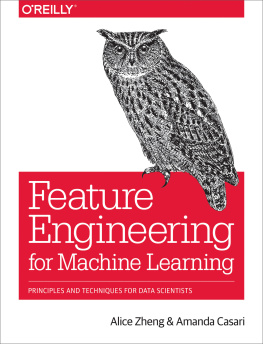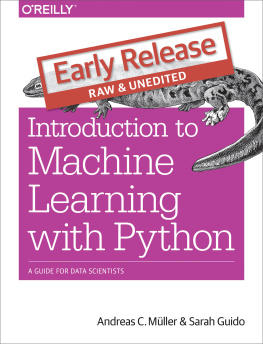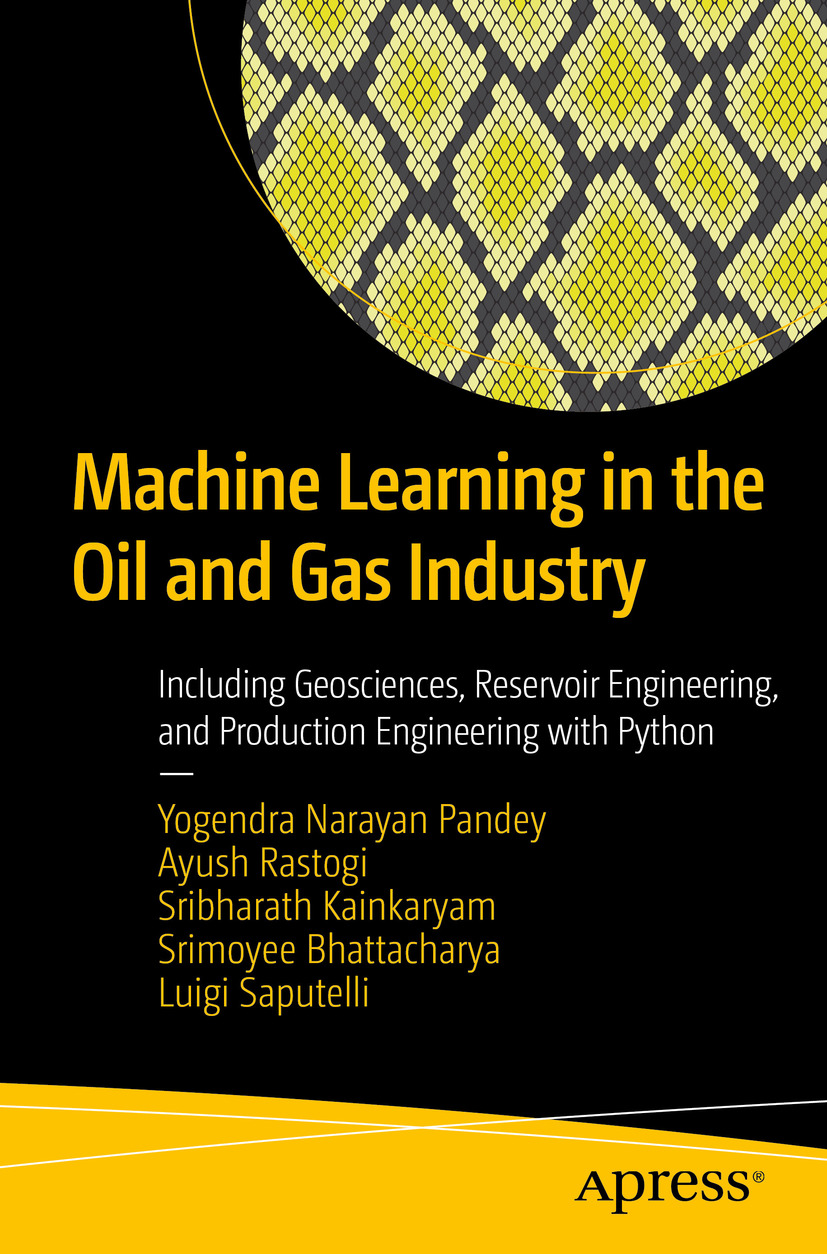Yogendra Narayan Pandey , Ayush Rastogi , Sribharath Kainkaryam , Srimoyee Bhattacharya and Luigi Saputelli
Machine Learning in the Oil and Gas Industry
Including Geosciences, Reservoir Engineering, and Production Engineering with Python
1st ed.
Yogendra Narayan Pandey
Houston, TX, USA
Ayush Rastogi
Denver, CO, USA
Sribharath Kainkaryam
Houston, TX, USA
Srimoyee Bhattacharya
Houston, TX, USA
Luigi Saputelli
Houston, TX, USA
Any source code or other supplementary material referenced by the author in this book is available to readers on GitHub via the books product page, located at www.apress.com/978-1-4842-6093-7 . For more detailed information, please visit http://www.apress.com/source-code .
ISBN 978-1-4842-6093-7 e-ISBN 978-1-4842-6094-4
https://doi.org/10.1007/978-1-4842-6094-4
Yogendra Narayan Pandey, Ayush Rastogi, Sribharath Kainkaryam, Srimoyee Bhattacharya, and Luigi Saputelli 2020
Apress Standard
The use of general descriptive names, registered names, trademarks, service marks, etc. in this publication does not imply, even in the absence of a specific statement, that such names are exempt from the relevant protective laws and regulations and therefore free for general use.
The publisher, the authors and the editors are safe to assume that the advice and information in this book are believed to be true and accurate at the date of publication. Neither the publisher nor the authors or the editors give a warranty, express or implied, with respect to the material contained herein or for any errors or omissions that may have been made. The publisher remains neutral with regard to jurisdictional claims in published maps and institutional affiliations.
Distributed to the book trade worldwide by Springer Science+Business Media New York, 1 New York Plaza, Suite 4600, New York, NY 10004-1562, USA. Phone 1-800-SPRINGER, fax (201) 348-4505, e-mail orders-ny@springer-sbm.com, or visit www.springeronline.com. Apress Media, LLC is a California LLC and the sole member (owner) is Springer Science + Business Media Finance Inc (SSBM Finance Inc). SSBM Finance Inc is a Delaware corporation.
To my family.
Yogendra
To my family for their patience and support through the journey of writing this book.
Ayush
To my family.
Sribharath
For my family, who provides me the energy and inspiration all the time.
Luigi
To my family, for all their love and support.
Srimoyee
To all geoscientists and petroleum engineers who wish to have a head start on machine learning problems and to the younger generation of data scientists who need a quick reference on oil and gas industry use cases.
The authors
Introduction
This book is for anyone interested in applications of machine learning in the oil and gas industry. The contents of the book are organized to provide foundational knowledge of computer programming, the implementation of machine learning and deep learning algorithms, and the ways and means to use them for solving oil and gas industry problems. This book does not provide production-quality codes, but it equips you with information on how you can start building a machine learning solution for the oil and gas industry problems discussed in this book and beyond. This book is organized into eight chapters, as follows.
Chapter overviews the different segments of the oil and gas industry and provides example applications of machine learning to upstream industry problems.
Chapter is a brief primer on the Python programming language. You become familiar with the basic syntaxes of the Python programming language. Afterward, you learn about Python libraries, such as NumPy, pandas, and Matplotlib, which are useful for certain machine learningrelated tasks.
Chapter overviews machine learning and deep learning concepts. In this chapter, you learn about supervised and unsupervised machine learning concepts. You work on examples using simplistic and clean datasets. The scikit-learn and TensorFlow libraries are used for implementing machine learning and deep learning code samples, respectively.
Chapter focuses on the application of machine learning to problems in seismic processing and interpretation. Using seismic data available from open data sources, we implement automated salt interpretation. Without going into implementation details, strategies for solving other seismic interpretation problems are briefly discussed.
Chapter focuses on the problems related to geological modeling, including supervised machine learning for estimation of the petrophysical properties away from well locations.
Chapter focuses on approaches for developing machine learning models in decline curve analysis and the use of these models in production forecasting.
Chapter covers production modeling using machine learning methodologies, including production optimization. Part of the chapter provides a methodology for virtual metering and the formulation of virtual sensors.
Chapter discusses opportunities, challenges, and expected future trends. In this chapter, we discuss the challenges encountered when executing machine learningbased digital transformation projects in the oil and gas industry. The potential pitfalls that lead to project failure and ways to avoid them are discussed. Also, the opportunities that inherently lie in addressing these challenges are discussed from both an executives and a practitioners perspective. A roadmap of the machine learningenabled digital transformation of the upstream industry over the coming years is provided.
Table of Contents
About the Authors
Yogendra Narayan Pandey
is a senior product manager at Oracle Cloud Infrastructure. Previously, he founded an oil and gas machine learning consultancy, Prabuddha LLC. He has more than 15 years of experience in orchestrating intelligent solutions for the oil and gas, utilities, and chemical industries. He has worked in different capacities with oil and gas and utility companies, including Halliburton, ExxonMobil, and ADNOC. Yogendra holds a bachelors degree in chemical engineering from the Indian Institute of Technology (BHU) and a PhD from the University of Houston, specializing in high-performance computing applications for complex engineering problems. He has served as an executive editor for the Journal of Natural Gas Science and Engineering. Also, he has authored/co-authored more than 25 peer-reviewed journal articles, conference publications, and patent applications. He is a member of the Society of Petroleum Engineers.
Ayush Rastogi
is a data scientist at BPX Energy (BP Lower48) based in Denver, CO. His research experience is in the area of mechanistic modeling for multiphase fluid flow while integrating physics-based and data-driven algorithms to develop robust predictive models. Some of his other areas of interest include gas well deliquification, liquid loading, mechanistic models, hydraulic fracturing, production data analytics, and machine learning applications in the oil and gas industry. His prior work experience is at Liberty Oilfield Services, where he was a technology and field engineer intern in Texas, North Dakota, and Colorado. He also has experience working as a petroleum engineering consultant in Houston, TX. He has published several papers for the Society of Petroleum Engineers and the


